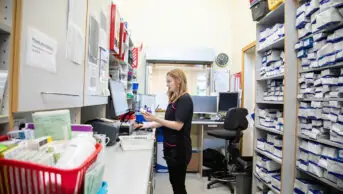
Mclean/Shutterstock.com
The problem:
You are the Responsible Pharmacist at a community pharmacy. When you arrive at work one morning, you find a note left by the locum pharmacist working the previous evening.
The note requests the pharmacy team contact a local GP surgery for a new prescription for a medicine that had been dispensed in the form of an oral solution, rather than the tablets specified in the original prescription.
After enquiring with the locum pharmacist about the details of the situation, you discover the patient came into the pharmacy at 18:00 with a prescription for a medicine they take regularly; however, the pharmacy only had stock of the oral solution. The patient required a dose of medication for that evening and had none left at home.
The locum pharmacist had attempted to telephone neighbouring pharmacies, but none of them had the right tablets in stock. The locum pharmacist did not want to send the patient to the hospital emergency department because of their age and frailty. The locum decided to call NHS 111; the operator informed the locum that the doctor would call back later, but the pharmacy was due to shut soon and the patient would be left with no medication. The patient had been dispensed oral solution before, but this was two years ago.
After taking a thorough history and being satisfied that it was clinically safe to do so, the locum supplied the equivalent dose of medication to the patient as oral solution.
As the Responsible Pharmacist on duty the following day, what should you do? What do you need to consider?

Source: Courtesy of Sean Quay
– “It would have been risky to send the patient away without medication”
While it was not strictly legal to have given the medication out in a different form, the locum has taken the necessary steps to ensure their actions were justified.
It would have been risky to send the patient away without any medication, as something harmful may have happened to them
In identifying that the patient was older and frail, the locum prioritised patient benefit and avoidance of harm. It would have been risky to send the patient away without any medication, as something harmful may have happened to them.
You need to consider the implications of the patient taking the medicine as oral solution. As you know from their records, they have taken it before and from the locum’s professional judgement, it was safe for them to do so. Perhaps the reason they stopped was something as simple as not liking the taste of the solution? Or it may have been a straightforward cost issue. In this circumstance, I believe the locum’s actions would be justifiable.
Autonomy dictates that we, as pharmacists, allow our patients to make their own decisions in their treatment, unless they seem unable to reasonably make decisions for themselves. If the locum supplied the alternative formulation with patient consent, counselled the patient on its use, explained the reason for supply, and notified the pharmacy team of the subsequent paperwork then I believe they have acted in the best interest of the patient.
From a legal point of view, the locum did ring neighbouring pharmacies and none of them were able to dispense the medication in tablet form. As long as someone in your team notifies the prescriber of the situation, I am confident they would accommodate the need for the new prescription.
Sean Quay is a pharmacist at the outpatient pharmacy at the Bristol Royal Infirmary

Source: Courtesy of Rifat Asghar-Hussain
– “The patient comes first”
The answer to the following questions will determine your actions:
- Was the medicine for a clear indication or an unlicensed use?;
- Was it for something where formulations shouldn’t be switched if the patient has already been stabilised?;
- How much was dispensed?;
- Did they contact the superintendent pharmacist or pharmacy owner before making the supply?;
- How is the patient now? I recommend calling them as soon as possible.
You need to establish whether a missed dose would cause harm and how the locum mitigated that risk. With any medicine, it is important to consider the consequences; for example, if the medicine was an antihypertensive, the liquid could have caused a significant drop in blood pressure. This is particularly worrying as the patient was older and frail. They could have sustained a fall which could have caused more harm. Missing a dose may also cause a surge in blood pressure, potentially leading to a stroke or heart attack.
If the medicine was prescribed for Parkinson’s disease, for example, missing a dose could compromise symptom control. However, changing the formulation to oral solution could also lead to complications owing to faster absorption of the medication into the bloodstream.
Phone the patient’s GP to have the supply covered. If they refuse, you will need to inform the superintendent and your indemnity provider.
The patient comes first, but you must look at the scenario carefully. If the locum pharmacist did not contact the superintendent, the option of being able to open a little longer and wait for NHS 111 to call back was not explored. However, this may have resulted in further indemnity issues as the pharmacy would be open out of contracted hours, but I would hope that it would have been justified.
The locum should be contacted, and all actions relayed to them.
Rifat Asghar-Hussain is a pharmacist contractor with two pharmacies in the West Midlands

Source: Courtesy of Jess Mei Liau-Williams
– “Being a community pharmacist, most decisions are made in isolation”
First, contact the patient to check on their welfare and find out if any further developments have occurred since the medicine was supplied. Confirm what medicine and formulation were dispensed and request permission to access the patient’s summary care record. Determine whether the patient had been in contact with any other healthcare professional since the medication was issued. For example, another pharmacy, an out-of-hours GP service or their regular GP. It is also worthwhile determining whether this is an isolated incident or an ongoing medicine supply issue.
Obtain the locum pharmacist’s account of events, clarifying any discrepancies with the patient’s narrative
You should contact the locum pharmacist and inform them that you have done this, and obtain their account of events, clarifying any discrepancies with the patient’s narrative. Determine if they accessed the patient’s summary care record to check the patient’s medication history details.
Next, contact the out-of-hours service which, if like our local service, will have a daytime administrative number. Enquire about any updates, clarify if follow-up could have been possible the night before and determine what learnings can be gleaned from this experience.
Finally, speak to the patient’s GP and agree on a plan for managing the patient’s ongoing medication needs if the tablet supply disruption is ongoing.
With regards to the emergency supply made, a prescription may not be needed to cover this. At our pharmacy, we have a locally commissioned emergency supply service that allows us to claim for the supply. In your discussion with the locum, explain to them how the service supports the decision-making process and discuss other tools that can support practice. Being a community pharmacist, most decisions are made in isolation — even more so for a locum — so it is important to discuss our shared learnings from the incident. Consider writing up a reflective continuing professional development log for revalidation.
Jess Mei Liau-Williams is a community pharmacist and preregistration trainee tutor in Bristol

Source: Courtesy of Richard Hough
– “The locum needs to be aware that the prescriber may not give retrospective consent”
Legally, the starting point for consideration is the Human Medicines Regulations 2012 (HMR). Ethically, it is the General Pharmaceutical Council’s (GPhC) Standards for Pharmacy Professionals.
The locum appears to have largely followed the requirements of the GPhC Standards including: (i) providing person-centred care; (ii) using their professional judgement; and (iii) making the care of the person their first concern. However, they have fallen short of other ethical standards, including not making best use of the resources available if, for example, they did not consult the patient’s summary care record or contact the superintendent pharmacist.
Regulation 214 of the Human Medicines Regulations states that “a person may not sell or supply a prescription-only medicine except in accordance with a prescription given by an appropriate practitioner”. There are limited exceptions to this requirement: Regulation 225 (emergency supply); Regulation 226A (serious shortage protocol); and Regulation 247 (pandemic).
The prescriber may not give (and is under no duty to give) retrospective consent and the locum would therefore be liable for any harm that came to the patient
By supplying the oral solution instead of tablets (presuming prescription-only in both dose forms) without having first obtained the consent of the prescriber, the pharmacist has breached the legal requirements of Regulation 214. Did the locum consider if a serious shortage protocol was in place (e.g. fluoxetine) and whether they could have substituted the dose form without consulting the prescriber?
Did the locum assess what harm, if any, may have come to the patient if they had missed a dose? An understanding of the nature of the medicine is therefore an important ethical consideration. If so, it would have been more appropriate for the locum to have made a Regulation 225 emergency supply. They appear to have fulfilled most of the legal requirements, other than making the appropriate record and annotating the label.
Finally, the locum needs to be made aware that the prescriber may not give (and is under no duty to give) retrospective consent. Therefore, the locum would be liable for any harm that came to the patient as they supplied a different dose form of the medicine without a valid prescription and may not be covered by professional indemnity insurance.
As the Responsible Pharmacist on duty the next day, you would not be liable for the locum’s actions. It is important that you do not perpetuate or attempt to cover up any legal or ethical failings. Presumably, your practical role is limited to trying to sort out a new prescription for the oral solution or obtaining prescriber amendment to the original prescription to cover the supply to the patient that had been made by the locum (being open and honest at all times with the prescriber). If you have concerns that the locum has acted illegally or unethically, you have a duty to speak up and report any suspected illegal or unethical actions to the pharmacy’s superintendent pharmacist.
Richard Hough is a partner, former pharmacist and head of healthcare at Brabners LLP



